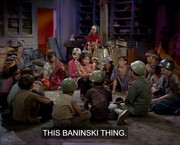I first saw Miri when I was a little kid. I re-watched it the other day, and I wondered if there’s more to it than I thought.
Are they going for it being a horror episode? The kids chanting and demeanor seemed creepy. Could that be why they said this planet is an exact duplicate of Earth in the 1960s? Maybe it’s to make audiences of that time imagine this is something that could happen to their world right now.
Is there any meaning to the changed vocabulary: onlies, grups, foolie. Is that supposed to signal that over the 300 years the kids have been without adults their morals have decayed along with their language? At one point Miri says They have such little time to do this dumb thing of theirs, this baninski thing. Is baninski supposed to be a real word or one of those words the kids made up?
Was there any point to their food being on the verge of running out? Mentioning the food raised the question of how they have any food if they’re not producing it. When I first saw it I imagined they had loads of TV dinners, but that would be the stores would have to have hundreds of years of supply. It also raises the question of energy for refrigerating and cooking. I suppose they wanted to have a ticking clock so that all the kids would be in peril if the Enterprise crew couldn’t save them. Otherwise you could think if the Enterprise fails to find a cure, the Federation could send teams to spend decades figuring it out, which wouldn’t be so bad for the kinds not reaching puberty since they had survived for centuries already. @alchemist posted some cut dialog at this link that explains they ate canned food.
Did Miri give them the idea of stealing the communicators out of jealousy? Did she know they were working on a cure that would let her development return to its normal rate, and part of her didn’t feel ready to be an adult? I got the idea the other kids thought it was just a prank, but Miri knew she was sabotaging their efforts to find a cure. Plotting to stop them from saving their lives seems so dark. I wonder what her motivations are supposed to be.
Are they going for it being a horror episode? The kids chanting and demeanor seemed creepy. Could that be why they said this planet is an exact duplicate of Earth in the 1960s? Maybe it’s to make audiences of that time imagine this is something that could happen to their world right now.
Is there any meaning to the changed vocabulary: onlies, grups, foolie. Is that supposed to signal that over the 300 years the kids have been without adults their morals have decayed along with their language? At one point Miri says They have such little time to do this dumb thing of theirs, this baninski thing. Is baninski supposed to be a real word or one of those words the kids made up?
Was there any point to their food being on the verge of running out? Mentioning the food raised the question of how they have any food if they’re not producing it. When I first saw it I imagined they had loads of TV dinners, but that would be the stores would have to have hundreds of years of supply. It also raises the question of energy for refrigerating and cooking. I suppose they wanted to have a ticking clock so that all the kids would be in peril if the Enterprise crew couldn’t save them. Otherwise you could think if the Enterprise fails to find a cure, the Federation could send teams to spend decades figuring it out, which wouldn’t be so bad for the kinds not reaching puberty since they had survived for centuries already. @alchemist posted some cut dialog at this link that explains they ate canned food.
Did Miri give them the idea of stealing the communicators out of jealousy? Did she know they were working on a cure that would let her development return to its normal rate, and part of her didn’t feel ready to be an adult? I got the idea the other kids thought it was just a prank, but Miri knew she was sabotaging their efforts to find a cure. Plotting to stop them from saving their lives seems so dark. I wonder what her motivations are supposed to be.



 It means someone who butts in; sticks his nose where it doesn't belong; interferes with someone else's business.
It means someone who butts in; sticks his nose where it doesn't belong; interferes with someone else's business.

